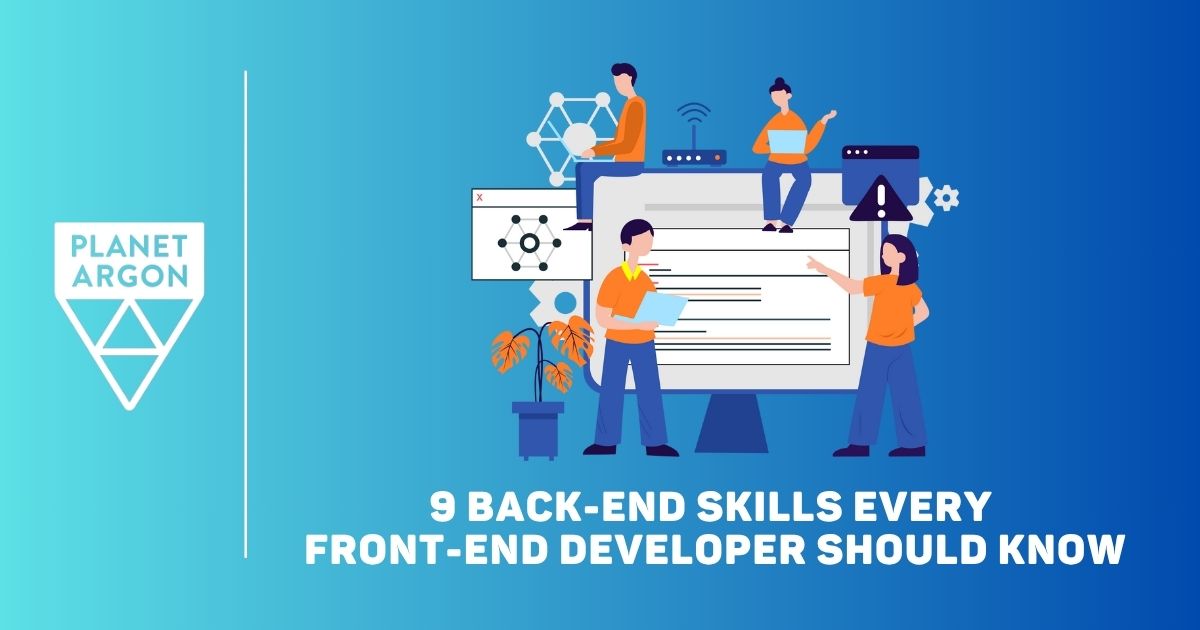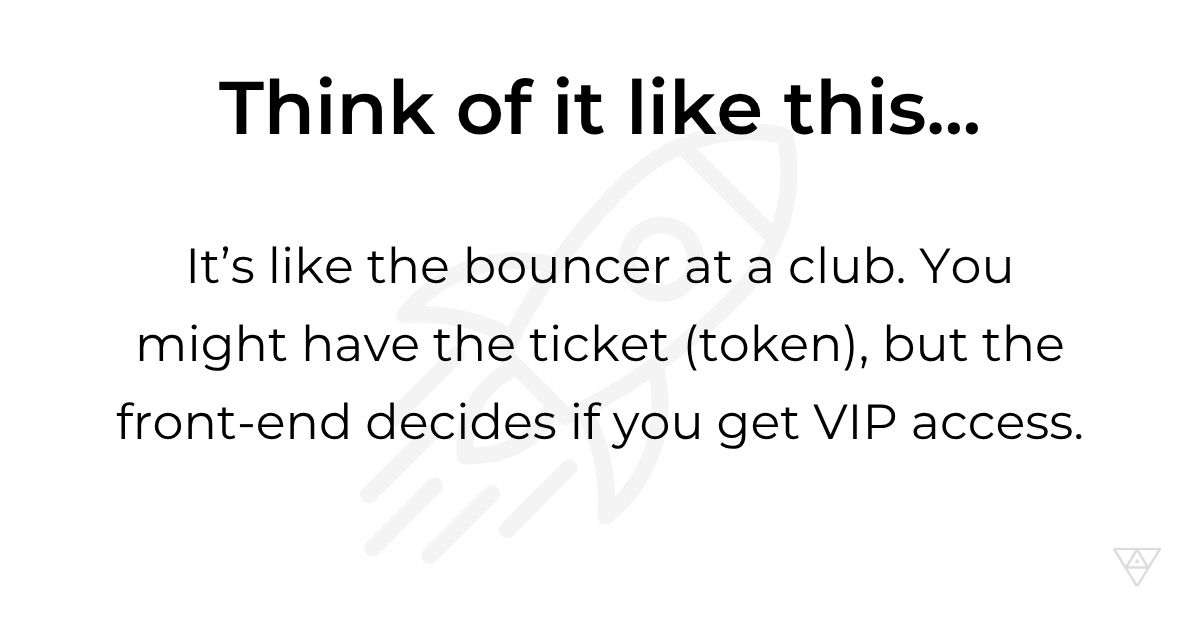Back-End Skills Every Front-End Developer Should Know
Reading time: ~ 5 minutes

At Planet Argon, we've observed that the distinction between front-end and back-end development has become increasingly nuanced. While this separation remains helpful in organizing teams and specializing talent, the reality is that modern front-end development encompasses a broad technical scope that extends well beyond traditional client-side concerns.
Think of a web app like a theater production:
The front-end is the set, lighting, and actors you see on stage—everything crafted to deliver a seamless experience to the audience.
The back-end? It’s the crew backstage running scripts, managing scene changes, and keeping the lights from catching fire.
At our Ruby on Rails development agency, we've seen the line between front-end and back-end development blur, much like a smudged touchscreen. While these roles are still useful for organizing teams, today's front-end development goes way beyond just making things look pretty.
This article outlines 9 key skill sets every modern front-end developer needs today. Whether you’re a Rails developer, a project manager evaluating partners, or someone eyeing a career switch, this guide is your backstage pass to what makes great front-end work happen.
1. Pixel-Perfect Design Implementation (Naturally)
Forget just “making it match the mockup.” A strong front-end dev knows how to:
- Craft semantic HTML like it’s poetry
- Optimize CSS for performance and scale
- Bake in accessibility so everyone’s invited
- Use meta tags that help your content shine on Google and social media
Clear, accessible, and performant interfaces help users trust and enjoy your product from the very first click.
2. API Integration: The Bridge Between Front and Back
Front-end developers translate between human clicks and server data, working with:
- REST, GraphQL, WebSockets
- Authentication headers, error responses, and data payloads
- Legacy SOAP APIs (yes, they still exist!)
They also know how to connect the dots—structuring API requests, handling responses, and managing tokens to bring Rails-powered data to life in JavaScript interfaces.
3. Data Management and Database Concepts
Even if they’re not writing complex queries, great front-end devs still need:
- Awareness of how SQL and NoSQL databases shape data
- Strategies for local storage and caching
- Understanding of data normalization and performance
Knowing how data is stored and structured helps developers present it in a way that feels fast, intuitive, and reliable.
If a project were a well-organized pantry, you might not stock it yourself (that’s the back-end), but you'd better know how to find the snacks fast!
4. HTTP Protocol and Server Communication
Your app is only as good as its ability to talk. Key front-end skills include:
- Recognizing and reacting to HTTP status codes (like a 404 facepalm)
- Understanding GET, POST, PUT, PATCH, DELETE
- Managing headers, cookies, and CORS
In our Ruby on Rails projects, the coordination between server-side response patterns and client-side request handling has a direct impact on application reliability and user experience.
5. Server-Side Rendering and Hybrid Architectures
Modern front-end development often incorporates server-side rendering and hybrid approaches:
- Implementation of JavaScript frameworks with server-side rendering capabilities
- Experience with isomorphic/universal JavaScript applications
- Integration with Ruby on Rails' view-rendering capabilities
- Implementation of progressive enhancement strategies
These approaches combine speed and interactivity, helping your app load faster while staying dynamic and user-friendly.
6. Authentication and Authorization Systems
Security is a shared responsibility across the development stack:
- Implementation of token-based authentication (JWT, OAuth)
- Session management strategies
- Role-based access control in the user interface
- Secure credential storage and transmission
Our front-end team collaborates closely with our Rails back-end team to ensure that authentication systems are both secure and user-friendly.

7. Security Awareness and Implementation
Front-end security knowledge has long been essential:
- Prevention of Cross-Site Scripting (XSS) vulnerabilities
- Protection against Cross-Site Request Forgery (CSRF)
- Implementation of Content Security Policies
- Awareness of common attack vectors and their mitigations
When combined with Ruby on Rails' robust security features, these front-end security practices create comprehensive protection for web applications.
Security isn't a feature—it’s a mindset.
8. Environment Configuration and Deployment
It’s not just about building apps—it’s about launching them.
- Managing environment variables across dev/stage/prod
- Integrating with CI/CD tools
- Feature flags for safe rollouts
Understanding where and how code is deployed ensures smoother launches, safer updates, and more reliable user access.
9. Core Development Competencies
Behind every great interface is a developer who knows their tools. These core skills are essential for building resilient and scalable web applications.
Version Control and Collaboration
Modern teams thrive on clean Git workflow practices:
- Feature branch workflows
- Pull request processes and code review practices
- Conflict resolution strategies
- Release management and versioning
At Planet Argon, every feature we ship passes through a peer review process—because two sets of eyes are better than one!
Good developers write code. Great developers collaborate.
Web Performance Optimization
Performance optimization requires understanding both client and server constraints:
- Resource loading prioritization
- Code splitting and lazy loading
- Image and asset optimization
- Cache management strategies
Automated Testing
Testing isn't a luxury—it's a safety net. From unit tests to end-to-end flows and accessibility checks, it’s how we ship with confidence.
- Unit testing of components and functions
- Integration testing of feature workflows
- End-to-end testing of complete user journeys
- Accessibility testing for inclusive user experiences
Monitoring and Debugging
The job doesn’t end at deploy. Production applications require sophisticated monitoring:
- Client-side error tracking and reporting
- Performance monitoring
- User behavior analytics
- Advanced debugging techniques across the stack
Bugs are like ghosts—easier to deal with when you know they’re there.” — Probably a teammate, at some point
The Full-Stack Mentality
The best front-end developers don’t just build what users see—they understand how the whole system works. At Planet Argon, we blend front-end precision with back-end depth to create apps that not only look good but also work beautifully.
Gone are the days of siloed teams and handoffs that break things. Today’s web projects thrive on collaboration, shared context, and full-stack thinking. That’s how we build fast, secure, and seamless Rails applications—by bridging the gap, not widening it.
Want to Build a Front-End That’s as Powerful as Your Rails App?
💬 Let’s chat about how we can enhance your app's stability, strength, and maintainability.
We Think You’ll Also Enjoy Reading…
Full-Stack Development Using React: Developers’ Quarterly Study
Ruby on Rails vs. React: Finding the Perfect Fit for Your Web Development Project
Hotwire for Rails Developers: Keeping UI Fast and Maintainable
FAQ’s
Q. Why does front-end performance matter?
Fast, responsive front-ends improve user experience, reduce bounce rates, and even boost SEO. Performance isn’t just a nice-to-have—it’s a business-critical part of any modern application.
Q. Do front-end developers need to know about databases and servers?
Yes, to a degree. While they might not manage databases directly, understanding how data is structured and delivered helps them build smarter, faster, and more reliable interfaces.
Q. What tools do your front-end developers use at Planet Argon?
We often work with React, JavaScript (and TypeScript), HTML/CSS, Git for version control, and testing tools like Jest or Cypress. We also integrate tightly with our Ruby on Rails back-end systems.
Q. How do your front-end and back-end teams collaborate?
We maintain open communication through shared planning, API contracts, code reviews, and feature branches. The goal: a seamless experience for users, regardless of what’s running under the hood.
Q. Can Planet Argon help with a front-end overhaul for our Rails app?
Absolutely. Whether you’re looking for a refreshed UI, improved performance, or full-stack collaboration, our team has extensive experience working on front-ends that seamlessly integrate with Rails backends.